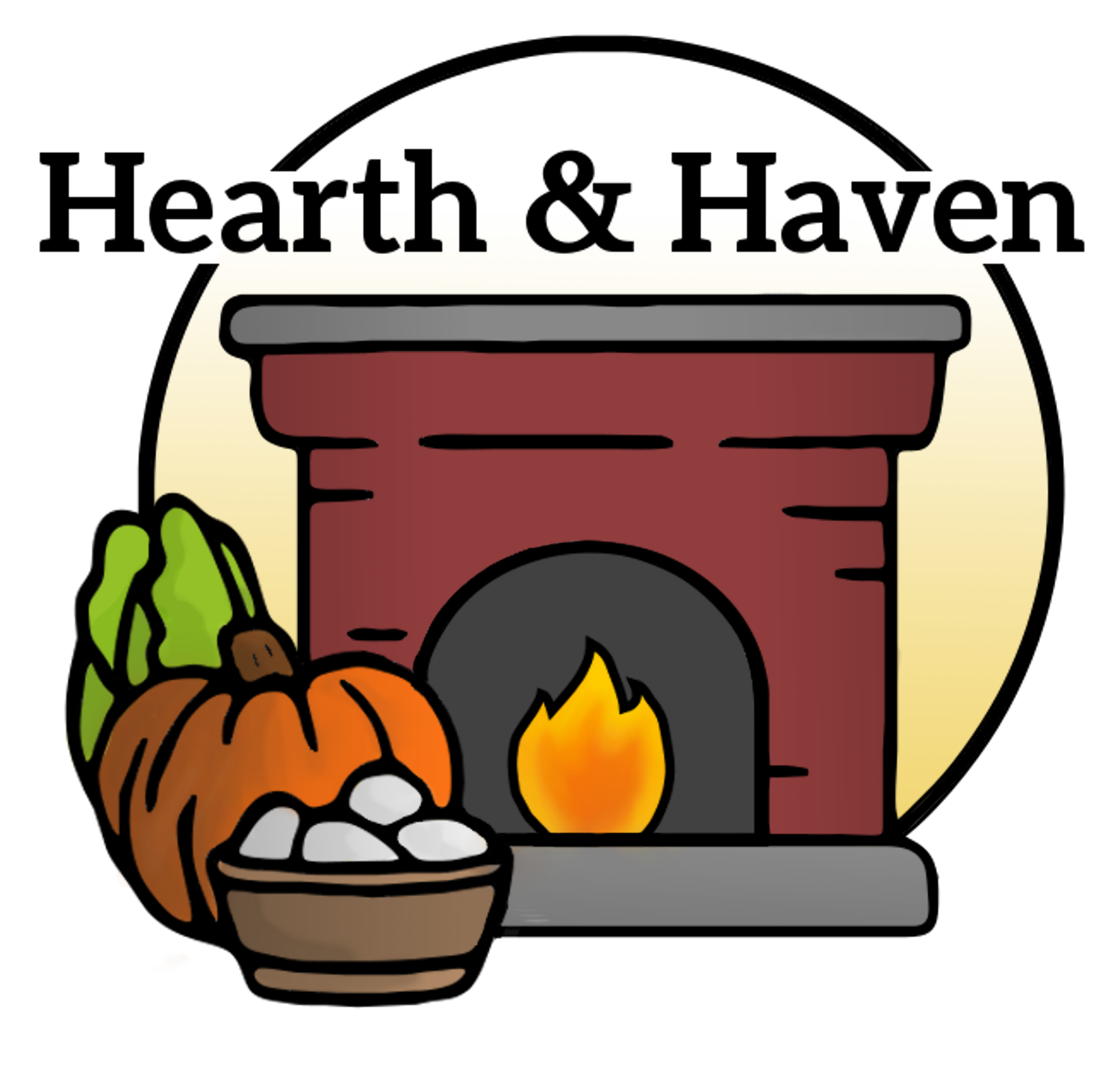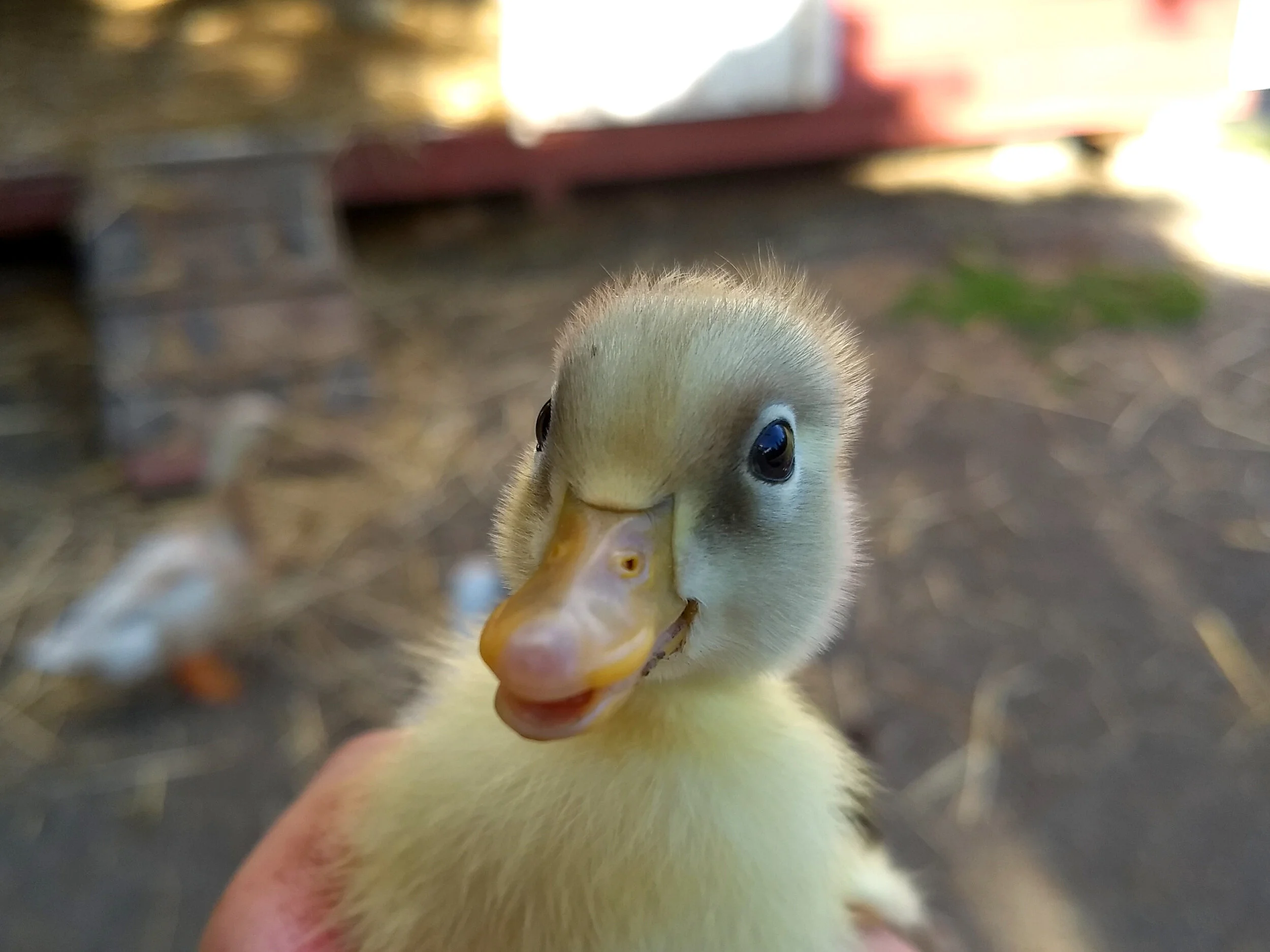CLOSED FOR 2023
Due to an outbreak of HPAI, all of Hearth & Haven’s
birds were culled by state and federal officials on
12/29/2022.
How can you help?
How can you help?
A Duck’s Life on the Farm
what makes our eggs special?
How the birds who produce them are treated!
We’re serious about achieving a high quality of life for our birds. It’s important to know that our ducks are living the most comfortable, natural, and happiest life possible - after all, happy birds lay the best eggs!
Of course, that’s easy to say - but what does it really mean?
Well, here’s what makes Hearth & Haven Farm different:
Quality of life starts on day one
Antoinette, a Welsh Harlequin hen, and her fuzzy babies
New additions to the flock are either hatched on the farm or come to us as adults from local poultry keepers.
Whenever possible, we let hens hatch their own ducklings. They nest wherever they choose and hatch their ducklings in a cozy straw-filled duck house. It’s natural, makes the birds happy - and it’s darn cute!
If no one’s in the mood to hatch eggs, we use our incubator and hand-raise ducklings. They spend their earliest days in the farmer’s office, move to the barn, and then to the grow-out field (a small, super-secure grassy space). At about 10 weeks old, they’re finally big enough to join the adults in one of the big fields.
How is that different?
Most farms get birds shipped in from hatcheries via the post office - which all too often goes wrong if the box is lost or delayed. Cold, hungry, confused baby birds just a day or two old end up starving to death by the thousands in small cardboard boxes, lost in some shipping warehouse. They are often replaced every few years to keep egg production high.
By hatching our own, we can ensure the ducklings get the best possible start in life - warm, well-fed, and safe! And by raising them right here, the ducks can grow with their own friends and families in a predictable environment.
Another treat, please?
good diet = good eggs
You can’t get good taste or good nutrition from your eggs if you start with lousy feed, so we’re careful to offer the best of everything!
The ducks’ main diet is an organic, non-GMO, locally milled, whole-grain feed. According to the ducks, it’s not just healthy - it tastes darn good, too!
Foraging in their green, grassy fields is also a big part of the ducks’ daily diet. Dandelions, bugs, grass - you name it, they’ll hoover it up.
To round things out, we also offer plenty of fresh fruit and veggies, most of which comes from the market garden. That provides a fun change to their diet and lots of extra vitamins - and ensures none of those veggies go to waste!
How is that different?
Most commercial poultry diets have an ingredients list that starts with something like “Plant Protein Products, Processed Grain By-Products” - who knows what’s in there?!
The Hearth & Haven ducks’ feed, on the other hand, starts with “Organic Peas, Organic Barley, Organic Wheat, Organic Corn”. Much better!
The flock foraging on a quiet winter day
Lots and lots of room
Seriously, lots! With spacious duck houses and big, grassy flocks, our ducks are never crowded. They have access to a grassy field AND swimming water 365 days/year.
All that fresh air and sunshine certainly is healthy, and most of all, it lets the ducks just act like ducks.
How is that different?
Large commercial egg producers confine their laying birds to huge warehouse-sized ‘barns’. Even the term ‘free range’ just means that birds have access to the outdoors - even if that space is a tiny square of dirt, completely devoid of greenery.
Did someone say ‘treats’?
The term ‘pasture-raised’ is a better description for Hearth & Haven ducks. They spend as much time as possible outdoors, and you can tell that they love it. Rain, snow, sleet - doesn’t matter, they still want to be outside.
Water is also an important part of our setup. While it is possible to raise ducks without access to a pool, they’re so much happier with something to get wet in. They ARE ducks, after all!
So we ensure our ducks always have access to swimming water. They love hopping in for a splash - even if it’s below freezing!
Pelican Field in spring
Freckles, a Magpie drake and one of our ‘foundation sires’
Don’t Forget the Boys
To hatch our own eggs, we need some boys - and we’re very picky about our drakes!
Many domestic male ducks can be…well, frankly, they can be jerks. Bad drakes injure hens, fight among themselves, and can generally make everyone miserable.
We select our drakes for temperament as well as health and productivity, and it’s amazing what a difference that makes. The flock is peaceful, and we’re able to house both sexes together year-round.
What happens to the extra drakes? Well, this is hard to talk about - but it’s part of farming, and we want to be up front about everything in our operation.
Ducks hatch out roughly 50/50 males/females. The males don’t produce eggs, of course, and one drake can cover 5-8 hens…so unfortunately, most of the drakes simply aren’t needed. Keeping all of them isn’t an option, either. Males can seriously injure and even kill each other - and the hens - if there is too much competition. What do you do?
It’s a tough choice, but we take a two-step approach to extra drakes. First, we try to re-home them whenever possible, sending them to flocks ready for a new drake. If that fails, we raise them to adulthood in the same pasture-based system as all other birds, then hire a professional poultry processor to cull them.
How is that different?
We feel that this is where raising our own ducklings on-farm really makes a difference. Ordering female-only birds from a hatchery each year certainly would make things easier, but what happens to all of those fluffy little male ducklings that no one wants? Unfortunately, it doesn’t make financial sense for hatcheries to raise most of those males to adulthood…so they are culled as day-old ducklings.
We do our best to ensure that our extra drakes have the very best life possible. They play with their siblings, eat the best food, and spend their time on green grass in the fresh air. When the time comes to cull them, we hire a professional to ensure the job is done properly.
Is this hard to talk about? Yes, it is - but we’ve put a lot of thought into these choices. We encourage everyone to talk to their egg and meat suppliers about what happens to surplus male animals. It’s important to find a farmer whose approach matches your preferences.







